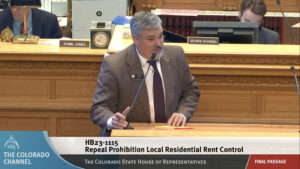A Colorado House leader nixed his plan Tuesday to let state residents keep primary-care providers even when they change jobs or insurers, opting instead for a bill making it easier for doctors to leave employers and continue practicing without facing extreme penalties.
Rep. Chris deGruy Kennedy, a Lakewood Democrat and the House speaker pro tempore, acknowledged even as he introduced House Bill 1005 in early January that he wanted to put forward a big idea and then sort out the details about how it could work in Colorado. On Tuesday, as he amended the measure to “a fragment of the original bill,” he admitted that there were too many obstacles to move the bill forward but said he and cosponsoring Rep. David Ortiz, D-Centennial, feel they are still helping Coloradans.
DeGruy Kennedy hoped to ensure residents could hang onto primary-care providers even if they changed insurance plans, building a relationship that can improve care and reduce unnecessary tests and procedures ordered by doctors unfamiliar with patients’ histories. HB 1005 would have made insurers include in networks all doctors licensed to practice in Colorado, accredited by a national association of primary-care providers, credentialed to take Medicaid patients and enrolled in a value-based alternative-payment model.
Obstacles to primary-care doc insurance portability
Insurers and business groups warned, however, that forcing expansion of networks, which insurers tailor so that they can offer large amounts of potential patients to participants in exchange for limitations on reimbursements, could raise insurance premiums significantly. It also would have tilted the field on reimbursement negotiations in favor of physicians who knew they could not be refused access to a network, affecting all state residents carrying individual or small-group insurance plans that are regulated by the state.

Colorado state Rep. Chris deGruy Kennedy speaks to the Colorado Chamber of Commerce’s Health Care Council in January.
So, during the bill’s initial hearing before the House Health & Human Services Committee on Feb. 21, deGruy Kennedy offered an amendment that would have required all networks to include only independent physicians not employed by large hospital networks. As he admitted during a follow-up hearing on Tuesday, however, that it was obvious that such a proposal was not going to be able to pass successfully through the committee.
As such, deGruy Kennedy tossed the plan to require all insurers to bring all primary-care providers in-network and abandoned efforts to allow any provider credentialed by Medicaid to be credentialed automatically by private insurance plans. Instead, the fourth-term legislator who’s authored several major health-care reforms focused on making it easier for providers to leave employers and still be able to practice by limiting the noncompete agreements that physician groups can impose on doctors who choose to leave them.
A new focus for HB 1005
While Colorado law already prohibits many forms of non-compete agreements between physician practices because of fears that they could leave the state with a shortage of health-care providers, such agreements still can require hefty payouts from exiting docs. HB 1005 now clarifies that the maximum total of damages that employees of physician practices would have to pay would be based on the number of patients they take with them, and it caps that figure at 50% of the primary-care provider’s annual salary.
“What we did with this bill is we put a big idea out there, something we really believed in … We ran into some barriers with the original approach,” deGruy Kennedy told committee members on Tuesday. “What remains is a fragment of the original bill. But we believe it is still a meaningful step forward to try to make sure we have better health-care access for people and better relationships between providers and their (employers).”
Democrats on the committee passed HB 1005 to the House floor for debate with an 8-3 party-line vote over Republican objections. Rep. Richard Holtorf, R-Akron, led the opposition, saying that rural hospitals and physician groups worry that allowing for easier exit from employment agreements could lead to loss of more rural providers to more lucrative jobs in larger metropolitan areas.

Colorado state Rep. Richard Holtorf speak on the House floor during the 2023 legislative session.
“We don’t need people to jump for a bigger, better deal. We need reliable health care. We need this in place,” Holtorf said. “We already have that instability in rural Colorado, so I don’t think this looks at solving the problems we have out there.”
Pushback against rural fears of primary-care exodus
DeGruy Kennedy said, however, that he doesn’t believe it’s the noncompete agreements that are holding people into their jobs in rural Colorado and that addressing issues of pay will do more to help hospitals than keeping such agreements in place. He envisions the bill mostly affecting employees or minority partners of independent practices that are purchased by larger health systems and want to leave those systems to work on their own, he said.
Committee chairwoman Rep. Lindsey Daugherty, D-Arvada, said she also suspects that doctors happy with the conditions of their practice won’t suddenly leap to leave jobs because it’s less expensive to break employment agreements.
“I think if a doctor has good working conditions, is happy at their job, I don’t see how the noncompete is going to impact continuity of care,” said Daugherty, an attorney who specializes in juvenile and family law. “I’m just not putting those pieces together. I actually don’t like noncompetes for any professions, including attorneys.”
With the most sweeping provisions removed from HB 1005, insurers are likely to turn more focus now to HB 1075, a bill that would fund a study of moving the state to a Canada-style, single-payer health-care system. That bill passed the same committee on a fully partisan vote on Feb. 7, but remains in the House Appropriations Committee awaiting its next hearing.
